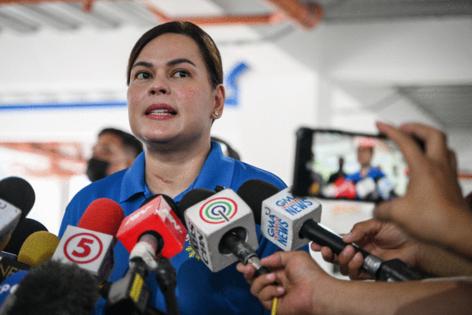Marcos-Duterte feud at center of Philippine midterm elections
Published in Political News
MANILA, Philippines — Philippine Vice President Sara Duterte won’t be on the ballot in Monday’s midterm elections, but the outcome could determine whether she keeps her job in a high-stakes contest centered around a feud between the country’s two most powerful families.
Following weeks of rallies across the country, more than 18,000 national and local positions will be contested on May 12. All eyes are on the Senate, where the 12 winners — or half of the 24-member chamber — will help decide the political fate of Duterte, who faces a July impeachment trial for an alleged death threat against President Ferdinand Marcos Jr.
Apart from the Marcos-Duterte feud, the crucial vote comes against the backdrop of the global trade war and maritime clashes with China, which is suspected of interfering in the polls. A strong showing by her so-called “DuterTEN” Senate hopefuls may help the vice president survive her trial and fuel a presidential bid in 2028. But Marcos also wants to avoid being weakened in the last half of his term-limited six years in office.
“If the Dutertes are politically castrated, that would leave the Marcos camp as a dominant entity,” said Anthony Lawrence Borja, an associate professor at De La Salle University in Manila. Still, “it might be possible that the Dutertes’ charisma could outweigh the patronage of the Marcos camp.”
Sara Duterte denies accusations of plotting to assassinate Marcos and misusing public funds and — despite the impeachment case — is still seen as a formidable presidential candidate for 2028.
There is no love lost between the two people who in 2022 joined in a successful presidential ticket before falling out over proposals to change the constitution that the Dutertes saw as a ploy to keep Marcos in office. Relations deteriorated amid a probe of the vice president’s use of her budget.
They reached a nadir this year after Marcos allowed the arrest of her father, ex-President Rodrigo Duterte, who awaits trial at the International Criminal Court for alleged crimes against humanity during his deadly drug war. But her family retains popular support in parts of the south, where Rodrigo — in absentia — and other family members are running for office.
Duterte said she doesn’t regret teaming up with Marcos. “The 2022 election was bound to happen, so that everyone can see what a Marcos can do to a country and that is just bring us to the road to perdition,” she told reporters earlier this month.
Marcos, who will hold a campaign rally in Manila on Friday, is the son of the late dictator Ferdinand Marcos. His family enjoys strong support in the north of the nation of 114 million people.
“This election will guide our government, our society on where our beloved Philippines is headed,” he said at a rally on Wednesday.
But underscoring the personal nature of the election, Marcos is opposed by his own sister, Senator Imee Marcos, who had helped broker the joint Marcos-Duterte ticket. Imee has criticized her brother’s administration over the arrest of Rodrigo Duterte, siding with the vice president.
“She understands that our current government has no direction,” Sara Duterte said at an April 24 rally with Imee in Manila, suggesting the senator should “change your last name.”
While recent elections in Australia, Canada and Singapore saw concern at U.S. tariffs help incumbents, trade is less of an issue for voters in the Philippines. Food security and employment issues are top concerns, and Duterte has slammed Marcos for failing to deliver on his 2022 campaign pledge to cut rice prices to 20 pesos (36 U.S. cents) a kilo, about half of current prices. The Marcos administration will only start selling the national staple at that price after the election.
The two families’ rivalry at the top of Philippine politics has foreign policy implications. Marcos has bolstered military ties with the U.S. while pushing back against Beijing’s sweeping claims over the South China Sea. Maritime clashes have seen the Chinese side use water cannons that Manila said had damaged its boats and injured its crew.
Marcos also shut down online casinos catering to the Chinese that flourished under the Rodrigo Duterte administration, which forged closer ties with Beijing. And Marcos has appeared at a rally for his Senate candidates saying that none of them support China’s aggressive actions in the contested waters — an oblique dig at the Duterte camp.
There are also suspicions Beijing is meddling in the polls.
China is “attempting to influence our elections,” National Security Council Assistant Director General Jonathan Malaya said on April 28, citing both intelligence findings and the “suspect” timing of Beijing’s assertion of sovereignty over an uninhabited reef in the South China Sea. A day later, a Chinese national was arrested with a suspected spying device near the Commission on Elections. A Senate committee is also looking at possible links between China and troll farms allegedly peddling disinformation.
Beijing denies any moves to spy or influence. “We have no interest in interfering in elections in the Philippines,” the Chinese embassy said in a statement.
At least two-thirds of the Senate must vote to convict and bar Duterte from public office. But those allied with Marcos won’t necessarily toe the administration line during the impeachment trial as politicians set their sights on the 2028 presidential election.
Political alignments “can shift and reshift” before then, said Dean Dulay, assistant professor of political science at Singapore Management University. “This midterm election may introduce new players in the Senate, but political maneuverings render them up for grabs,” he said, as it “sets the stage for the long game that is 2028.”
_____
(With assistance from Philip J. Heijmans and Andreo Calonzo.)
_____
©2025 Bloomberg L.P. Visit bloomberg.com. Distributed by Tribune Content Agency, LLC.




























































Comments